How parents can help kids deal with body image and social media
Should you tell your kids they’re beautiful? Does taking selfies make your teen a narcissist? A new book by psychologist and mum Collett Smart aims to help parents deal with the dilemmas modern life and technology is throwing at our teens and tweens.
Should you tell your children they’re beautiful? And does taking selfies make your teenager a narcissist?
A new book by psychologist, teacher and mum-of-three Collett Smart aims to help parents deal with the ever-changing dilemmas modern life and technology is throwing at our teens and tweens.
Read our exclusive extract on body image and social media.

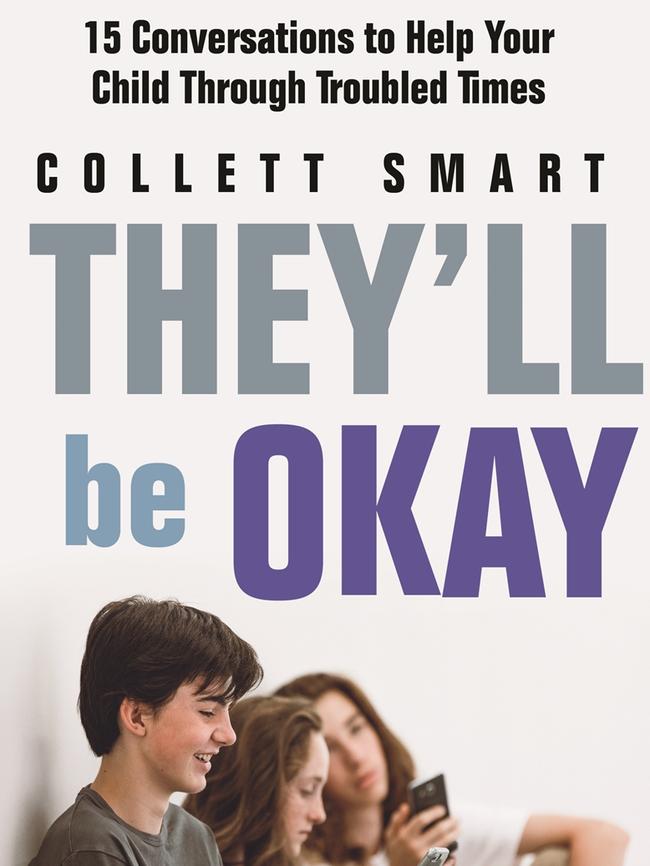
****
Be assured, taking selfies does not make your teen a narcissist. There is a lot more to developing narcissistic personality disorder than smiling into a screen.
Photos are part of making memories and saying, ‘Look, I was here!’. Image-sharing apps allow kids to take and send photos of everything from food to friends.
This sharing is a normal part of today’s teens’ relationships and friendships.

In fact, research suggests that moderate use of social media might actually benefit many teens in the areas of feeling connected to their peers, developing social skills and having access to help if needed.
These platforms can also be a positive outlet for self-expression and development of self-identity for many young users. As with anything, however, there is a negative side to image-sharing apps that we need to help our teens navigate.
WHEN SELFIES BECOME PART OF SELF-OBJECTIFICATION
Self-objectification happens when people treat themselves as objects to be looked at and evaluated based upon their appearance, which can lead to appearance anxiety, body shame, lower self-esteem, negative mood and various forms of disordered eating.
One of the downsides of selfies is that teens feel the pressure to display perfectly curated photos, often modelled on photoshopped, posed and objectified celebrity feeds.
Teens admit to taking hundreds of photos before choosing the perfect one to put online. Because apps like Instagram provide instant and measurable rewards in the form of comments and likes, teens then evaluate their worth based on the amount they receive on a photo.
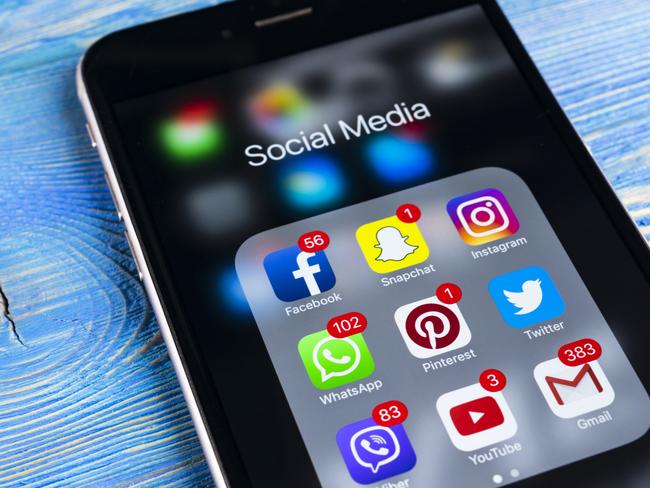
This is when posting selfies can become less about keeping up with the latest event or sharing your life with your friends and becomes more of an avenue of self-objectification.
Although many girls start out posting selfies hoping to prove their body confidence, posting images of large, small and in-between bodies isn’t really a solution to fighting body shame either.
In doing this we’re only fighting a symptom of the problem, not the root or the real cause. If we want to fight body shame and promote body positivity, we need to fight the lie that girls’ bodies are the most important thing they have to offer.
Girls need to learn to see more in themselves, in order to be more than young women who self-objectify and become preoccupied with their looks.
WHEN BODY FOCUS BECOMES UNHEALTHY
Always being ‘on’ and connected through both traditional and social media means our children are surrounded by overt and covert messages about body image.
They’re inundated with a stream of messages with unrealistic narrow body types, in what we call ‘the thin ideal’ for girls or having the perfect build and six-pack for boys.

Teeth are whitened, skin is tightened and brightened. Confusion, anxiety and insecurity about their bodies are magnified through constant comparison and self-judgement.
If you suspect your child has developed an unhealthy obsession with their weight, body or exercise routine it is important that you gently talk to them about the patterns you have noticed. As a family you might need to develop new ways of talking about bodies and health.
BODY IMAGE AND BOYS’ HEALTH
Body insecurity is not just limited to our girls. Boys are more body conscious than we realise and body image issues for them are very real.
Unfortunately, boys are far less likely to address their own body image concerns and are more likely to struggle alone, because body image issues have long been portrayed as a ‘female’ thing.

Boys also tend to laugh off criticism or make a joke to cover up painful comments about their bodies, but they carry the hurt in secret.
When questioned, boys believe extreme exercise and dieting are issues for both genders, with adults slower to recognise this.
Whenever I ask a group of teen boys what they think the main area of body focus for boys is, they yell out, ‘A six-pack!’ I’ve even heard 9-year-old boys talking about and trying to compare their six-packs.
Boys tend to worry about how muscular they are and whether they are too skinny. Boys tend to associate muscles with being masculine, with many boys believing they can achieve the ‘perfect’ body type if they work really hard for it.
One UK survey found a general naivety among boys about when they are being advertised to, particularly through non-traditional methods such as social media.
It also found that although boys say they are aware that media changes images, they tend to believe that the media changes the way women look more than men.
They are often shocked by how much has been adjusted, when it is pointed out.
HOW CAN WE COUNTER SELF-OBJECTIFICATION AND POOR BODY IMAGE?
Apart from social media and traditional advertising messages, it might be time for parents to ask ourselves: How do I regard my own body? What does my child hear me say about my body? How do we talk about food and exercise in our home?
As parents, we model self-objectification when we constantly obsess about appearances, thinness, clothing, make-up and outer appearance in general. Children quickly learn that only certain types of bodies are acceptable, and that appearance is what is most valued by their families.
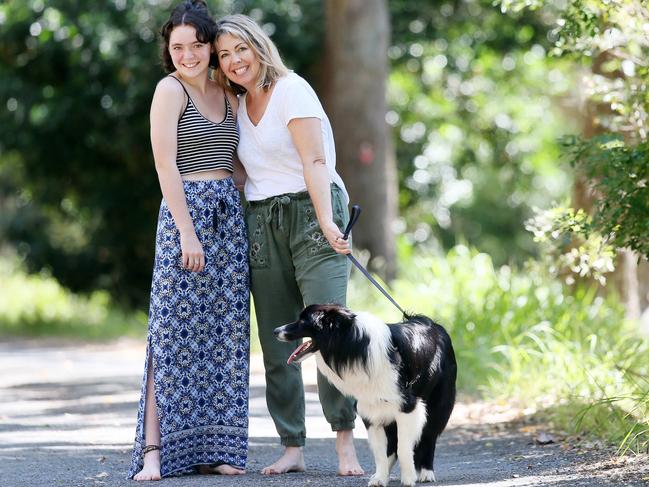
When we complain about wrinkles and sagging skin, we send the message that getting older is something negative and to be avoided.
Little ears are listening and young eyes are watching our every move, as they attempt to make sense of and interpret their world.
Parents and adults, please unlearn the destructive messages you were taught, and learn to love your own body in the process.
HOW TO TALK TO YOUR CHILD ABOUT THEIR BODY
Parents sometimes ask me, ‘What do I say if my child gains or loses weight?’
Rule Number One: Don’t talk to your child about their body.
If your child has gained weight, say nothing. If your child has lost weight, say nothing. If a friend or family member’s weight has changed, say nothing.
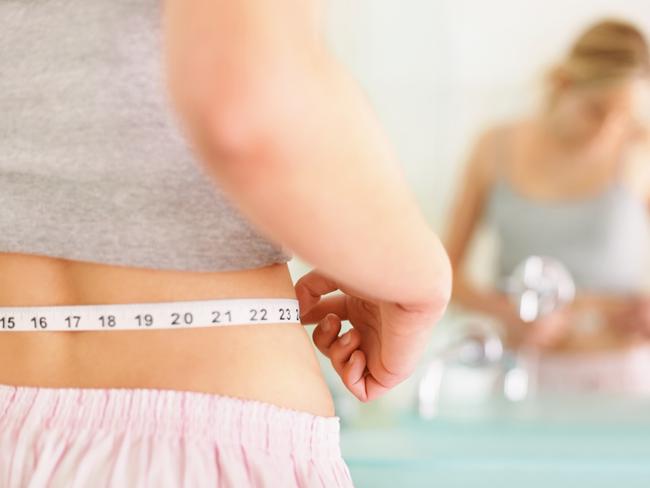
Make sure you have lots of fresh fruits and vegetables in the home, because these nourish their growing bodies, but also avoid banning certain foods.
Refer to some foods as celebration food or ‘sometimes food’, rather than ‘bad’ food. Help your child to learn to eat intuitively (i.e. eat when hungry and stop when you are full).
Ensure your children don’t skip breakfast, because not even a vehicle can run without fuel in the tank.
They need food in their bodies for energy but also for their brains, so that they can concentrate at school.
Poorly nourished kids and adults end up ‘hangry’ (angry because they’re hungry). So healthy nourishment is good for their relationships too.
CAN I TELL MY CHILDREN THEY ARE BEAUTIFUL?
After a talk I gave on media messages, one mother asked me if it was okay to tell her children she thought they were beautiful, because she said when she was growing up her parents never mentioned her appearance — ever! So she grew up believing they must think she is ugly.
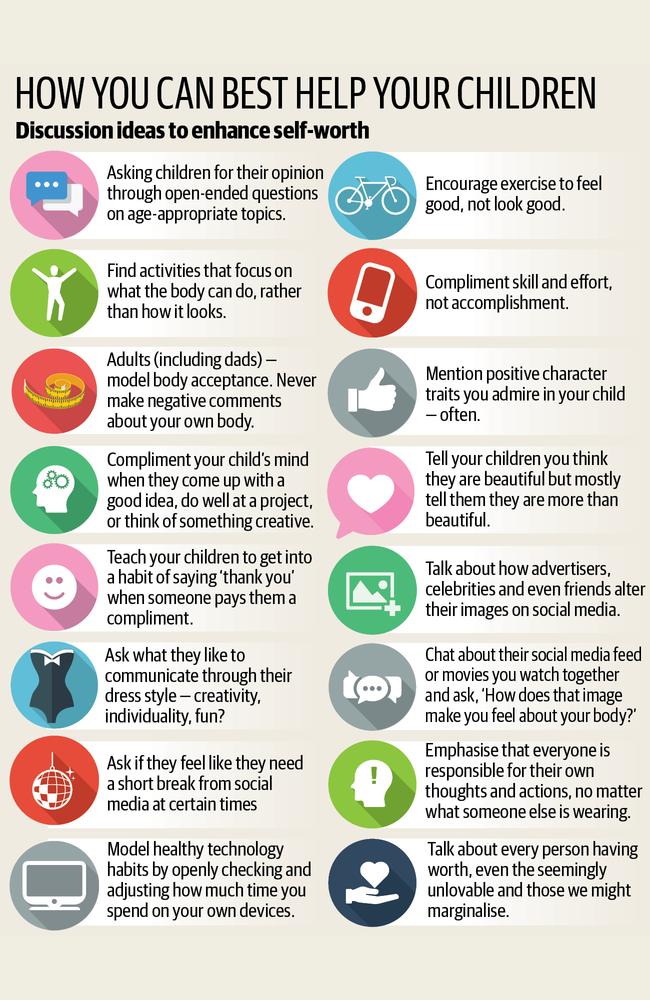
There are so many messages telling our children that they don’t measure up to narrow standards of beauty, so yes, I do believe there are times we must tell our children (both boys and girls) how beautiful they are to us. Because to me, my children are breathtaking!
We should be careful not to make their appearance our main focus. We should tell them how beautiful we think their hearts and minds are — because their appearance isn’t what matters most to us.
This is an edited extract from They’ll Be Okay: 15 Conversations to Help Your Child Through Troubled Times by Collett Smart published by Hachette Australia, RRP $32.99. Available in-store and online from Jan 8, 2019.


